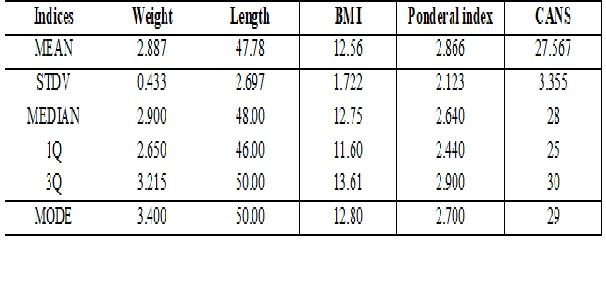CAN score- a boon to resource limited settings
Abstract
Introduction: Fetal Malnutrition is one of the major determinants of neonatal outcomes, especially in under privileged communities. Assessment may be tedious, expensive and often eating into resources limiting its effective management. CAN scoring emerging as a promising simple and cost effective tool needs validation before wide spread adoption.
Materials and Methods: We carried out a Prospective Study of 3 months duration between 1st November 2018 and 31st January 2019 at our Hospital, a tertiary care centre with neonatal intensive care unit (NICU) in South India.
Results: Total number of newbornin our study was 104. The incidence of malnutrition according to CAN Score is 29.8%, Ponderal Index 12.5%, Weight for Gestational Age is 13.5% and Body Mass Index is 14.4%. The Sensitivity, Specificity and Positive Predictive Value of CANS are 83.87%, 79.45%, 63.41%, which are high and are statistically Significant.
Conclusion: CAN Score appear to be a Simple and Cheap Tool to accurately assess Neonatal Malnutrition.
Downloads
References
Scott KK, Usher RH. Fetal malnutrition: Incidence, causes and effects. Amer J Obstetr. 1966; 94 (7):951–63.
Vikram singhal, Prashanth Agal, Nutan Kamath.Detection of Fetal Malnutrition by CAN score at birth and its comparison with other methods of determining Intrauterine Growth. IndianJournal of Clinical Practice. April 2012;22(11) :576-82
Soundarya M, Basavaprabhu A, Raghuveera K, et al. Comparative Assessment of Fetal Malnutrition by Anthropometry and CAN Score. Iran J Pediatr. 2012 Mar;22(1):70-6.[pubmed]
Vishwanath Machakanur, Sudha Rudrappa. A Simple Screening-Tool for Fetal-Malnutrition at Birth: A Comparative Study of Clinical Assessment of Nutritional Status (CANS) versus others. Journal of Evolution of Medical and Dental Sciences 2014; Vol. 3, Issue 29, July21; Page: 8027-8032, DOI: 10.14260/jemds/2014/3007.
Metcoff J. Clinical assessment of nutritional status at birth. Fetal malnutrition and SGA are not synonymous. Pediatr Clin North Am. 1994 Oct;41(5):875-91.[pubmed]
Varahala AM, Chidugulla SK, Pathuri NK. Assessment of foetal malnutrition by CANSCORE and comparison with anthropometric attributes–a tertiary care centre experience. IOSR Journal of Dental and Medical Sciences 2015;14(10):07-12.
Waghmare P, Balpande N D, Lakhkar B B. Assessment of fetal malnutrition by can score. PediatricOncall Journal [serial online] 2012[cited 2012 January 1];9. Art #1. Available From: http://www.pediatriconcall.com/pediatric-journal/View/fulltext-articles/453/J/0/0/89/0
Apte SV, Iyengar L. Composition of the human foetus. Br J Nutr. 1972 Mar;27(2):305-12.[pubmed]
Georgieff MK, Sasanow SR. Nutritional assessment of the neonate. Clin Perinatol. 1986 Mar;13(1):73-89.[pubmed]
Singh M.Disorders of weight and gestation. In : Care of the Newborn, 7th ed. New Delhi, Sagar Publications : 2010: 234-25.[pubmed]
Hill RM, Verniaud WM, Deter RL, et al. The effect of intrauterine malnutrition on the term infant: a 14 year prospective study. Acta Pediatr Scand. 1984;73(4):482–7.
Dr Abhaykumar Dhanorkar, Dr Prashant Bagdey, Dr Arun Humne. Detection of Fetal Malnutrition at birth by clinical assessment of nutritional status score. Health sciences: An International Journal. 2014; 4(1):1-5.
Sankhyan N, Sharma VK, Singh S. Detection of fetal malnutrition using "CAN score". Indian J Pediatr. 2009 Sep;76(9):903-6. doi: 10.1007/s12098-009-0196-9. Epub 2009 Nov 4.[pubmed]
Adebami OJ, Owa JA, Oyedeji GA, et al. Prevalence and problems of foetal malnutrition in term babies at Wesley Guild Hospital, South Western Nigeria. West Afr J Med. 2007;26(4):278–82.
Liladhar Kashyap, Rashmi Dwivedi. Detection of Fetal malnutrition by clinical assessment of nutritional status score (CAN SCORE) at birth and its comparison with other methods of determining intrauterine growth. Pediatric On Call Journal. January 2006;(3): 1.
Taylor D. Nayak US. CAN score-Assessment of nutritional status of newborns. J Obstetric Gynecol. 2002;52(1):76–8.
Cole TJ, Henson GL, Tremble JM, et al. Birthweight for length: ponderal index, body mass index or Benn index? Ann Hum Biol. 1997 Jul-Aug; 24(4):289-98.[pubmed]

Copyright (c) 2019 Author (s). Published by Siddharth Health Research and Social Welfare Society

This work is licensed under a Creative Commons Attribution 4.0 International License.


 OAI - Open Archives Initiative
OAI - Open Archives Initiative


